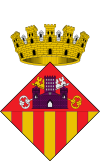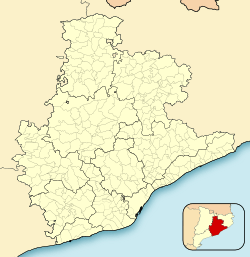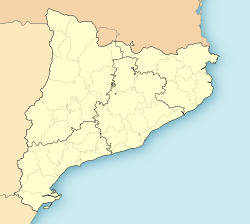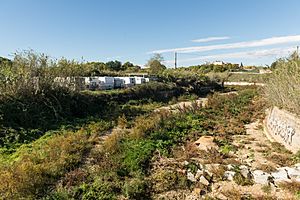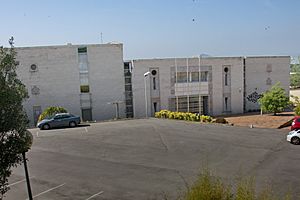Sant Cugat del Vallès facts for kids
Quick facts for kids
Sant Cugat del Vallès
|
|||
|---|---|---|---|
|
Municipality
|
|||
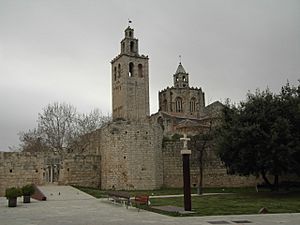
San Cugat del Vallès monastery
|
|||
|
|||
| Country | Spain | ||
| Community | Catalonia | ||
| Province | Barcelona | ||
| Comarca | Vallès Occidental | ||
| Area | |||
| • Total | 48.2 km2 (18.6 sq mi) | ||
| Elevation | 124 m (407 ft) | ||
| Population
(2018)
|
|||
| • Total | 90,664 | ||
| • Density | 1,881.0/km2 (4,872/sq mi) | ||
| Demonym(s) | Santcugatenc | ||
Sant Cugat del Vallès is a lively town and municipality located just north of Barcelona in Catalonia, Spain. Long ago, it was called Castrum Octavianum, meaning 'the castle of Octavianus'. Later, during the Second Spanish Republic, it was known as Pins del Vallès. The town gets its current name from Saint Cucuphas. People believe he was martyred right where the amazing medieval monastery stands today. The 'del Vallès' part of its name tells us it's in the historic Vallès region.
Contents
About Sant Cugat del Vallès
Sant Cugat is a popular place to live, especially for families. It's only about 20 kilometers from Barcelona, making it easy to visit the big city. The town is surrounded by nature and has a nice shopping area just for people walking.
You can find many restaurants, a concert hall, two movie theaters, and a large shopping center here. Sant Cugat has grown a lot recently, with more babies born here than in bigger cities like Barcelona in 2004. It has also almost joined up with the nearby towns of Rubí and Cerdanyola del Vallès.
The town has its own train station. This station offers a direct metro connection to Barcelona city center. You can also easily reach the industrial cities of Terrassa and Sabadell by train.
Important Buildings
Besides the famous monastery, Sant Cugat has other important buildings. These include the School of Architecture of the Vallès. There's also the Centre d'Alt Rendiment (CAR), which is a special training center for professional athletes.
Town Politics
Sant Cugat has a history of supporting Catalan nationalism, which focuses on the unique culture and identity of Catalonia. For 32 years, a group called Convergència i Unió was in charge of the town's government. However, in 2019, the Republican Left of Catalonia took control. They did this with help from other political groups like PSC and CUP.
Exploring Sant Cugat
Sant Cugat is home to several interesting historical places. These sites show the town's long history and beautiful architecture.
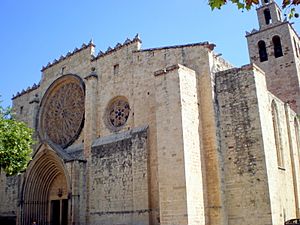
- Monastery of Sant Cugat: A very old and important monastery.
- Hermitage of Sant Medir: A small chapel from the 10th century.
- Hermitage of Sant Adjutori: Another old chapel, also from the 10th century.
- Torre Negra: A historic tower built in the 12th century.
- Gothic bridge of Can Vernet: A beautiful bridge from the 14th century.
- Casa Armet: A notable house in the area.
Population and Districts
Sant Cugat del Vallès is made up of several districts and villages. Each has its own community.
- Mira-sol: This district has about 14,474 people living there.
- Valldoreix: About 8,272 people call Valldoreix home.
- La Floresta: This area has around 4,553 inhabitants.
- Les Planes: The smallest of these, with about 1,290 residents.
The table below shows how the population of Sant Cugat has grown over the years.
| 1900 | 1930 | 1950 | 1970 | 1986 | 2014 |
|---|---|---|---|---|---|
| 2,120 | 5,190 | 6,992 | 20,490 | 35,302 | 87,118 |
Education in Sant Cugat
Sant Cugat has several schools, including options for international students.
- The main secondary schools are IES Angeleta Ferrer i Sensat de Sant Cugat and Institut Joaquima Pla i Farreras.
- The Japanese School of Barcelona is located here. It's a special school for Japanese students living abroad.
- The Hoshuko Barcelona Educación Japonesa is a weekend Japanese school. It holds its classes in the Japanese School of Barcelona building.
- The European School of Barcelona (IES) is an international school. It focuses on teaching different languages from outside Spain. Popular languages studied there include English, French, and Chinese.
Culture and Traditions
Sant Cugat is proud of its Catalan culture. Many groups and clubs work to keep traditional Catalan activities alive.
- A sardana club (Entitat Sardanista de Sant Cugat) promotes this popular Catalan circle dance.
- A castellers club was started in 1996. These groups build amazing human towers.
- A diables club was formed in 1990. They perform traditional dances with fireworks.
- A geganters club creates and parades giant figures.
Sant Cugat also has several museums. The Museu de Sant Cugat is located at the Monastery. It focuses on the history of the town and its people.
Sister Cities
Sant Cugat del Vallès has special connections with other cities around the world. These are called "sister cities."
See also
 In Spanish: San Cugat del Vallés para niños
In Spanish: San Cugat del Vallés para niños
 | Anna J. Cooper |
 | Mary McLeod Bethune |
 | Lillie Mae Bradford |



